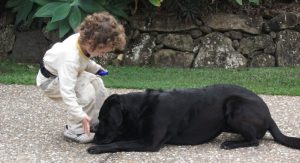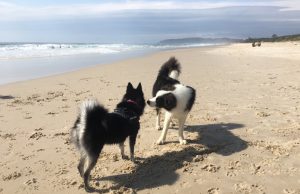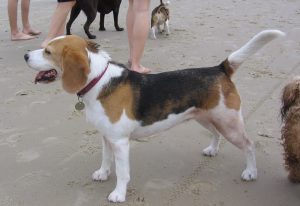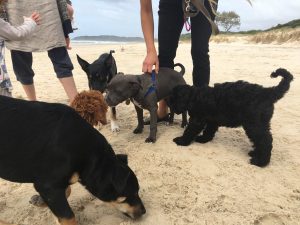THE ADOLESCENT TEENAGER
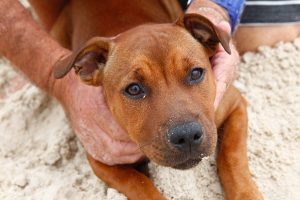 This is a period of time when we feel that everything we have taught our dogs goes out the window, they have selective hearing and push boundaries, just like an adolescent teenager.
This is a period of time when we feel that everything we have taught our dogs goes out the window, they have selective hearing and push boundaries, just like an adolescent teenager.
Every puppy will go through this transition period between puppy to adulthood. The easy going compliant puppy starts to test boundaries and becomes unresponsive. The body looks fully developed but the brain has been left behind and is still developing. Behaviours such as over-excitement, chewing and distractibility are a result of normal physical and developmental changes. The body is going through growth spurts, (yes your dog might get growing pains), secondary teething, surging hormones and fear periods.
Unfortunately lots of dogs are re-homed during this phase in their life, given up to shelters or rescue organisations, as they are deemed as destructive and out of control. This is when they need lots of EXERCISE, both physical and mental. I mean LOTS! An hour longwalk on a lead does not suffice; they need to have off leash time, high energy games, dog play, swimming, off leash exploring, and time just being a dog. This does not include walking next to you or not being allowed to sniff anything or say hello to anyone. This is not sufficient at this challenging age. Instead, embrace this fun period, it’s a time to enjoy this playfulness and enthusiasm.
Some ideas to help are more exercise, both physically and mentally, including problem solving games and environmental enrichment, however also allowing for down time, to allow the stress hormones to settle. Remember exercise shouldn’t be repetitive as their bodies are still growing and joint straining activities should be avoided.
It is also imperative that your dog maintain social contact with other dogs; as an over exuberant adolescent needs to communicate as a teenager, and to exhibit self-control. This is sometimes when a dog goes over threshold in play and aggression can seep in. So play with known regular playmates is helpful as there is already a mutual understanding established. Dog daycare is a great idea so they can play themselves to exhaustion. However it is also important that they learn how to do polite meet and greets on lead and to be able to walk past other dogs without saying ‘hello’. Maintain your dog’s social skills with humans, sitting or lying down or at least all four paws on the ground for greetings. Keep their social repertoire colourful; variety is the ‘spice of life’. Continuing their social contact with the world makes sure they view it as a fun place.
Maintaining TRAINING is vitally important at this stage; generating firm boundaries and making them work for everything. Teach them that you are the giver of good things. The selective hearing button can switch on, their level of response lessens and your dog’s focus can shift. They are less interested in you and more interested in their friends and finding their independence, and working out where they fit in our crazy world. If your dog previously had a relatively reliable recall you might have to only allow off leash time in certain safe environments.
Management at this stage is vitally important too through generating and maintaining boundaries and managing their environments. They may need to be still crated. Provide lots of chewy things to help reduce destruction, not allow off leash freedom when they have a poor recall, manage jumping, continue working on default behaviours and maintain focus exercises. If you have been through a puppy program, you would have learnt exercises to generate stability such as mat training, focusing and self-control, these are all incredibly important to continue and reinforce.
ENJOY this crazy period, have fun with your adolescent!!!!!!!! GO party too…….sometimes.
Anna Tasker, Paw Power Dog Training 0431 511215 / www.pawpower.com.au

